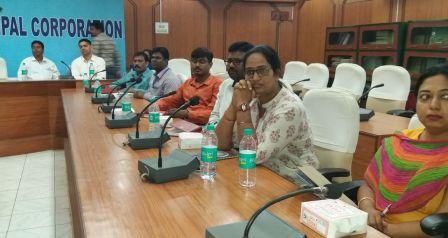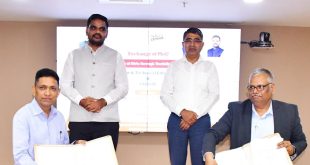Bhubaneswar: The e-Waste Awareness Program for Bulk Consumers envisaged under the Clean e-Bhubaneswar Project was launched at the Bhubaneswar Municipal Corporation (BMC) premises on Friday.
BMC office was the first Government office in the city to undergo such an awareness campaign as the project has already started educating school students on the importance of e-waste and how we should contribute towards its scientific and systematic management.
Senior BMC officials were present at the event.
Along with the awareness program, the event also marked the commencement of an e-waste collection drive at the BMC premises, and as an initiation of the processes for inventorization and channelization of e-waste generated at BMC.
The Clean e-Bhubaneswar Project, under the ‘IFC-EU Eco-Cities’ program, aims to ensure that the city’s e-waste is collected and recycled in an environmentally responsible manner.
BMC plays a significant role in the collaborative model of the project that is bringing together government, private sector and academia to deliberate on e-waste management solutions for Bhubaneswar.
Through this event, BMC looks to inspire other institutions and bulk consumers to come forward and take part in the Clean e-Bhubaneswar Project. The awareness event was organised by the BMC and project implementation partners Sofies Sustainability Leaders Pvt. Ltd. and Siddha Development Research and Consultancy (SDRC).
The event focused on key aspects of e-waste and its management. The global, Indian, and Bhubaneswar city-level e-waste scenarios, their significance and volumes, were reviewed along with the hazards and opportunities surrounding e-waste management.
The E-Waste (Management) Rules, 2016, were discussed as well as roles of the different stakeholders as defined by these rules. The roles and responsibilities of bulk consumers were examined in detail.
Speaking at the event, Deputy Commissioner Sanitation Lalatendu Sahu said awareness generation on e-waste is part of the ambitious Eco-Cities Programme as it would help in creating better environment and surrounding.
Zonal Deputy Commissioner Subhranshu Mishra suggested gifting of new electronic gadgets/appliances in exchange for e-waste to incentivise better and efficient collection of e-waste across the city.
He also called for a scientific and meaningful integration of the informal sector in e-waste management so that the city would benefit and citizens would have a non-toxic environment to live in.
Under the ‘IFC-EU Eco-Cities’ program, the International Finance Corporation (IFC) of the World Bank Group, in partnership with implementing organizations, Sofies and SDRC, seeks to establish a working model for e-waste collection in Bhubaneswar that would be self-sustaining and serve as a model for effective e-waste management in other cities as well.
An important aspect of the Clean e-Bhubaneswar project is to support local authorities including the Bhubaneswar Municipal Corporation and Orissa State Pollution Control Board in generating awareness among consumers, bulk consumers, households, schools, colleges and other institutions regarding e-waste.
The BMC invites government institutions and other bulk consumers to join this initiative and take part in building a sustainable solution for the management of e-waste in the city of Bhubaneswar.
Bulk consumers can visit the Clean E-Bhubaneswar initiative website http://www.cleanebhubaneswar.in/ or call the toll-free number 1800-120-2723 for further information.
As per an unofficial estimation, the city is generating more than 2,700 tonnes of e-waste in a year. While desktop PCs including their accessories and peripherals constitute the maximum of the e-waste burden, mobiles have become another headache towards the e-waste mess.
However, with an efficient management plan if the e-waste can be processed scientifically, then it could yield 44 types of rare elements on the Periodic Table. The entire country generates around 2 million tonnes of e-waste in a year.
 Update Odisha-Latest Odisha News I Breaking News Get latest news on Odisha, Govt. Jobs, OSSC, OPSC, Entertainment, Crime, Sports, and Education
Update Odisha-Latest Odisha News I Breaking News Get latest news on Odisha, Govt. Jobs, OSSC, OPSC, Entertainment, Crime, Sports, and Education



